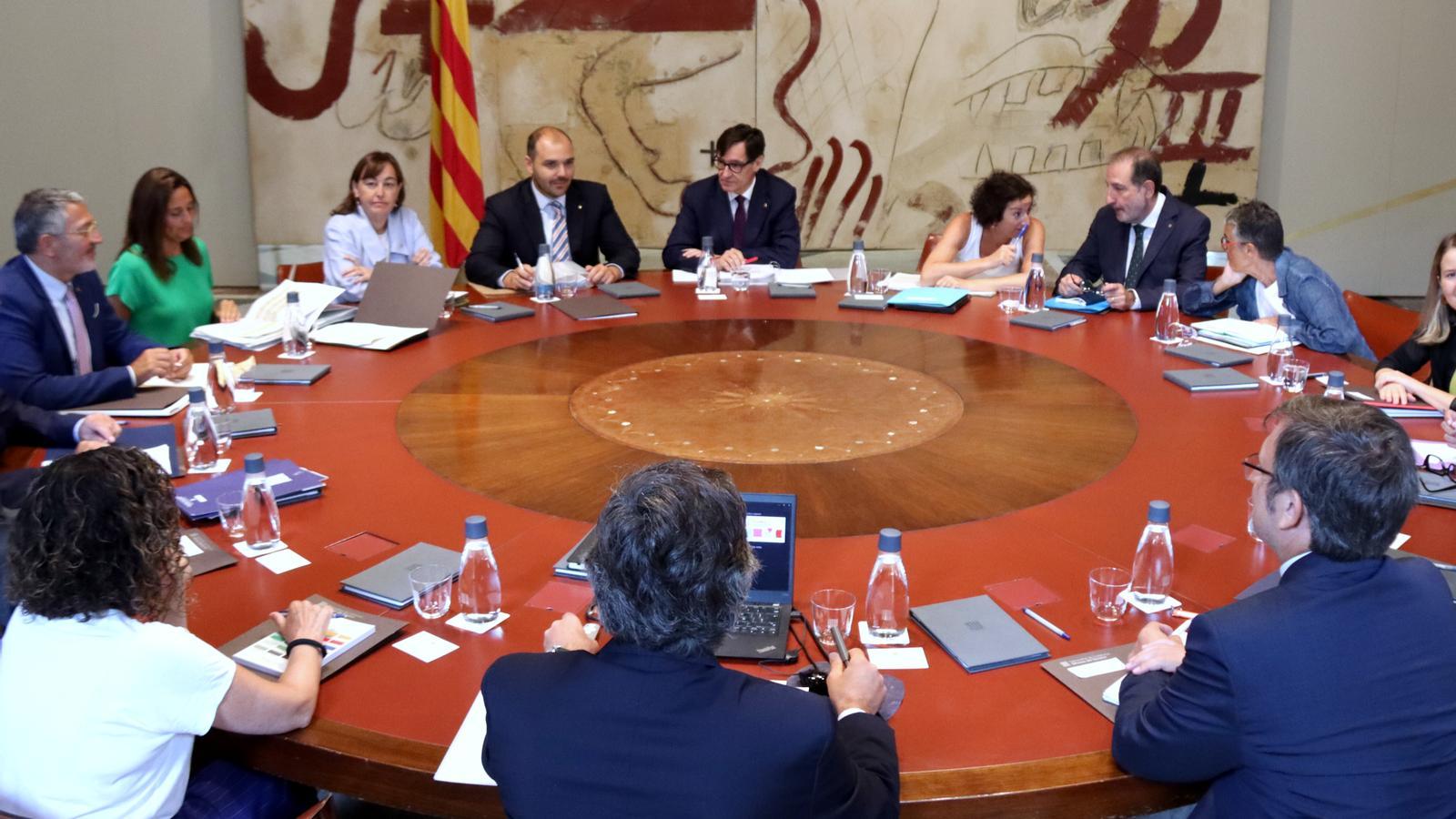The chaos on the commuter train system, following another weekend of incidents, threatens to further complicate the Catalan government's current situation. To try to find a solution to the constant breakdowns, the Catalan government held an emergency meeting this Tuesday morning with Renfe and Adif to discuss new measures beyond the already activated emergency plan. The Regional Minister for Territory, Silvia Paneque, and the Minister for the Presidency, Albert Dalmau, warned the heads of Renfe and Adif that "episodes like these" cannot happen again, regardless of the many projects underway to improve the service. "We cannot accept situations like the ones we've experienced," Paneque said at a press conference. A new meeting will be held next Tuesday, chaired by the President of the Generalitat (Catalan Government), Salvador Illa.
Technicians, IT professionals, and staff negotiations: the Catalan government takes a step further with the Catalan Treasury.
The executive meets after the holidays and aims to approve the budget on January 1st with ERC and Comuns


BarcelonaThe Catalan government took a new step this Tuesday to begin sizing the Catalan Tax Agency (ATC) in light of the functions it should assume under the new single financing model. This decree gives it greater decision-making power over its personnel and structure and improves the efficiency of this entity, which, starting in 2028, will assume full management of personal income tax, two years later than initially agreed between the ERC and the PSC. This was approved by the executive council in its first meeting after the holidays, just as the Socialists and Republicans agreed in July. The decree law, which for now has no specific resources assigned, will have to go through Parliament. The Government maintains that, while waiting for the new singular financing model to be implemented, it will not involve any duplication with the State Tax Administration Agency.
"We will move forward, step by step. We must do so safely and realistically because it is a complex issue, with the ultimate goal of being able to achieve tax collection in Catalonia," said the Government spokesperson and Minister of Territory, Silvia Paneque, at a press conference. The text modifies the Catalan tax code, from 2017, and creates two new bodies: the Corps of Tax Agents and the Higher Corps of Tax Informatics (until now, there were none on staff). It also incorporates the concept of the program contract into the entity's daily operations and grants the ATC "full autonomy" in personnel matters and in the collective bargaining of working conditions within the bodies. A hotspot in view of the division that has been generated among Treasury officials by his possible transfer to the ATC.
Now, with the singular financing, the hottest thing is in the kitchen sink. The bilateral commission of July 14th left up in the air the principle of ordinality, which would guarantee that Catalonia would not lose ground in the distribution of resources in relation to its contribution. The PSC and ERC defend it, and, in fact, the president of the Generalitat, Salvador Illa, He stated in an interview in the ARA that the PSOE had also incorporated into its ideology, already in the Granada Declaration in 2013. Now, The Spanish government has not assumed that this issue will apply to new financing. regional, although the PSC reiterated this Monday that it considers it a "necessary condition." "It's part of the negotiating spaces we have, which are already several three-way," said PSC spokesperson and number two, Lluïsa Moret.
Budget objective
The Socialists are aware that progress (or lack of progress) with the one-off financing will determine the agenda the government will open as soon as the political year begins: the negotiation of the 2026 budget. The goal, Paneque said, is to have it approved by January 1st, after failing to do so last year, and in the "what was achieved last year, and in the" It will do so "preferentially" with Esquerra i Comuns as investiture partners and with the majority of laws that the Catalan executive has approved in its first year in the Generalitat, in order to know what its priorities are. "Others, surprisingly, have already stated that they will not support it when there is not even a proposal on the table," Paneque lamented, referring to Junts. Carles Puigdemont's party has abandoned the president of the Generalitat, Salvador Illa, in the face of the negotiations.
These conversations intersect with the ongoing dialogue with the Republicans. on the new governance of Barcelona airport, in which the Ministry of Transport is also participating. Although Paneque has said that nothing has been finalized yet, he has confirmed that creating an Aena subsidiary in Catalonia, as has been done, for example, with the transfer of CercaníasImproving airport governance was part of the investiture agreements between the PSC and ERC. "But the priority now is to deploy everything related to the expansion," the spokesperson emphasized, ruling out that this is incompatible with the fight against climate change—as the Comunes party accuses it of. In this regard, she announced that the government will send its contributions to the central executive for the state pact against the climate emergency that Pedro Sánchez wants to approve, following the crisis caused by the fires this summer.
The government will reflect primarily from Friday to Saturday in Arnes, in Terres de l'Ebre, where it will hold a series of work sessions to prepare for the new political year. Paneque explained that they have chosen this area to demonstrate the government's commitment to a territory that has suffered the ravages of wildfires this summer, with the blaze burning up to 3,000 hectares near the Els Ports Natural Park, where a firefighter died. At the first meeting of the executive council after the holidays, the Government also gave the green light to an expenditure of 200 million for the first call for the neighborhood law to subsidize urban and social improvement projects in degraded neighborhoods in Catalonia
